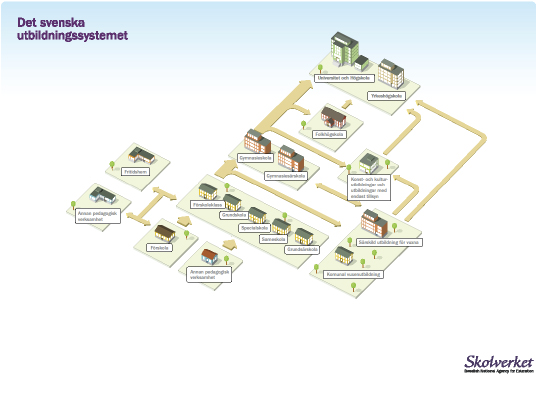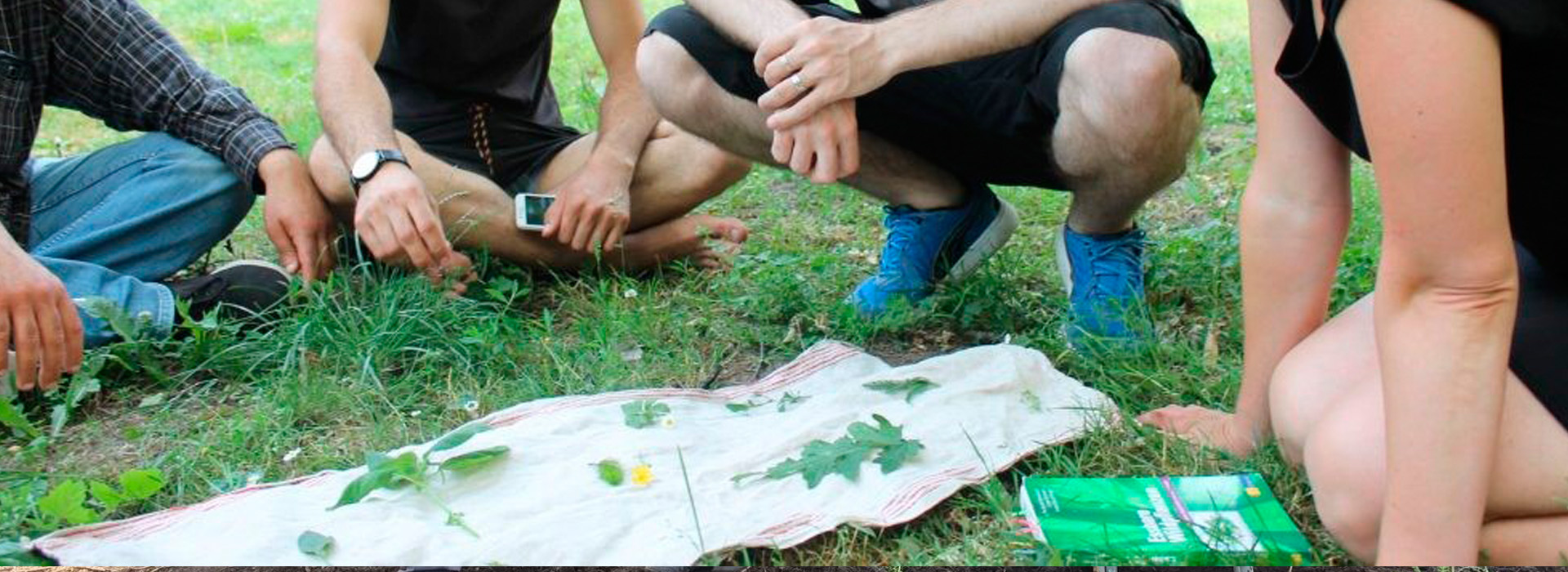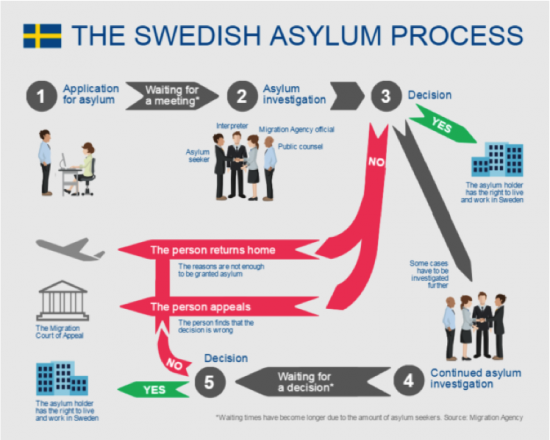Människor har rätt till politisk asyl och i Sverige anges asylskälen vara bl.a. att fly från sitt hemland på grund av förföljelse, att vara alternativt skyddsbehövande på grund av risk för dödsstraff eller kroppsstraff eller att ha särskilt ömmande omständigheter knutna till individens hälsa. Invandring kan också vara på grund av arbetssökande, anhöriginvandring, återvändande emigranter och adoptering. Termen avser huvudsakligen personer med permanent uppehållstillstånd och som har, eller kan få medborgarskap.
Det är oklart om termen omfattar illegala invandrare d.v.s. personer som vistas i landet permanent utan uppehållstillstånd och personer med hinder för verkställighet för utvisning. Generellt gäller inte termen för asylsökande som väntar på beslut eller personer med tillfälliga uppehållstillstånd t.ex. gästarbetare, internationella studenter och EU-migranter. En nyanländ är en invandrare, vanligtvis en flykting, som har fått uppehållstillstånd och är därför inte längre en asylsökande samt har rätt till uppstartande aktiviteter
I Sverige har personer med uppehållstillstånd samma rätt till vård som svenska medborgare medan asylsökande, irreguljära migranter och papperslösa har rätt till akutvård och mödravård.
Enligt svensk lag måste landsting och kommuner erbjuda hälsovård till alla invånare inom reg-ionen. Utöver de svenska medborgarna så har de med uppehållstillstånd också tillgång till häl-sovården. Personer som har sökt asyl har till viss del tillgång till den svenska hälsovården och sedan juli 2013 gäller samma regler även för personer som håller sig gömda i Sverige och papperslösa.
Alla barn har rätt till sjukvård oavsett medborgarskap. Asylsökande är erbjudna en gratis häl-soundersökning vid ankomst i Sverige och illegala invandrare samt odokumenterade personer kommer erbjudas samma sak när de söker vård. Personer som uppehåller sig i Sverige utan uppehållstillstånd har även rätt till akutvård, tandvård, mödravård, barnmorskevård, preven-tivmedels- och abortrådgivning och infektionssjukvård.
Asylsökande och odokumenterade barn under 18 år har rätt till sjukvård och tandvård med samma förutsättningar som andra barn i landstingets region. Asylsökande som inte förstår svenska har även rätt till en tolk under läkarbesök. Denna tjänst är gratis. I många landsting erbjuds hälsovård i flera olika språk, information om detta hittar man på landstingets websida och ibland på vårdcentralens egna websida.
Om du vill arbeta i Sverige och kommer från ett land som inte är del av EU/EES eller Schweiz, måste du ha arbets- och uppehållstillstånd. För att starta eget företag eller bli delägare i ett fö-retag behöver du uppehållstillstånd. Om du har haft uppehållstillstånd i minst fem år i ett EU- land men inte är EU-medborgare kan ansöka om att få ställning som varaktigt bosatt i det landet.
Varaktigt bosatta har vissa rättigheter som liknar de som EU-medborgare har. Om du avser att bosätta dig i Sverige, måste du registrera det hos Skatteverket. Denna registrering kallas för folkbokföring.
Svenska utbildningsväsendet kortfattat:
Ditt barn kan gå i förskola från den dagen barnet fyller 1 år. Lek är en viktig del i förskolan.
Hösten 2018 stiftades det en lag som gör det obligatoriskt för barn från 6 år att börja i förskoleklass.
Förskoleklass är en egen skolform som innehåller mycket kreativt arbete och lek, förskoleklassen är gratis. Denna skolform är obligatorisk. Alla barn går i grundskolan från ungefär 7-års ålder. Grundskolan är obligatorisk och är 9 årskurser.
De flesta ungdomar går därefter 3-årigt gymnasium. Nyanlända som har permanent uppehållstillstånd har rätt att börja gymnasiet innan vårterminens slut, det år de fyller 20 år. För asylsökande är gränsen det år de fyller 18. Men det finns särskilda krav på godkända betyg från tidigare utbildning. Gymnasieskolan förbereder eleverna till vidare studier på högskola eller universitet eller för arbetslivet utan vidare studier.

Olika myndigheters ansvar i migrationsprocessen.
Migrationsverket är inte enbart en länk i migrationskedjan utan har även ansvar att hålla ihop kedjan.
Myndigheter som är berörda av migrationsprocesser:
- Svenska ambassader och konsulat utomlands som tar emot visumansökningar samt arbets- och uppehållstillstånd.
- Polisen som har ansvar för gränskontroller och för individer som inte vill lämna landet självmant.
- Migrationsdomstolarna och Migrationsöverdomstolen till vilka Migrationsverkets beslut kan överklagas.
- Länsstyrelserna ansvarar för att det finns förberedelser och kapacitet hos kommuner-na att ta emot nyanlända. Länsstyrelsen ska även koordinera arbetet med att ge asylsökande meningsfulla aktiviteter i ett tidigt skede under väntetiden.
- Kommunerna, tar emot asylsökande som har fått uppehållstillstånd och har ansvar för att ta emot både asylsökande ensamkommande barn och barn som har fått uppe-hållstillstånd.
- Landstinget har ansvar för asylsökares hälsa.
- Icke-statliga organisationer och hjälporganisationer kan bland annat erbjuda stöd för asylsökande.
- Barnombudsmannen, Länsstyrelsen, Socialstyrelsen, kommunerna och landstingen samarbetar vid mottagandet av ensamkommande barn.
Experimentella studier har visat sig effektiva i att påvisa diskrimineringens existens. Vi vet med all säkert att diskriminering förhindrar många människor att få ett meningsfullt arbete och bra lön, som de skulle ha fått annars.
Åtminstone har omfattande diskriminering påvisats i den svenska bostadsmarknaden. Vid en studie skickades intresseanmälan till en utannonserad hyreslägenhet med tre fiktiva personer: Maria Andersson, Erik Johansson och Mohammed Rashid. Medan Maria fick vidare kontakt eller besked att komma på visning i 53 procent av fallen och Erik i 41 procent, fick Mohammed endast det i 18% av fallen.
Resultaten från studierna visar effektivt att diskriminering existerar men är svåra att tyda. Exempelvis hur stor del av skillnaden i arbetslöshet mellan svenskfödda och utlandsfödda är på grund av diskriminering eller av andra faktorer.

 English
English  Deutsch
Deutsch  Español
Español  Svenska
Svenska 
